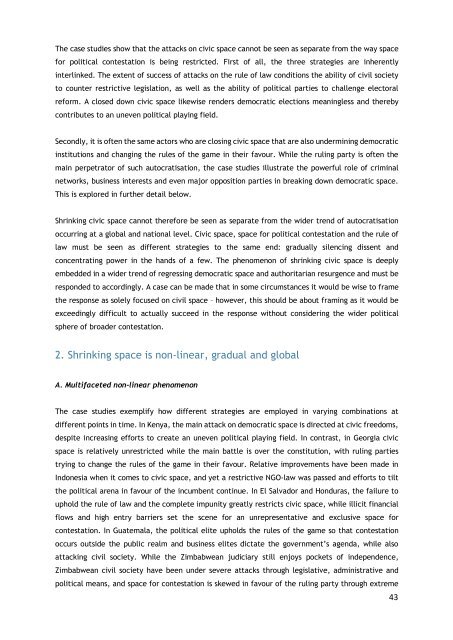Thinking Democratically: A Comprehensive Approach to Countering and Preventing Shrinking Space
You also want an ePaper? Increase the reach of your titles
YUMPU automatically turns print PDFs into web optimized ePapers that Google loves.
The case studies show that the attacks on civic space cannot be seen as separate from the way space<br />
for political contestation is being restricted. First of all, the three strategies are inherently<br />
interlinked. The extent of success of attacks on the rule of law conditions the ability of civil society<br />
<strong>to</strong> counter restrictive legislation, as well as the ability of political parties <strong>to</strong> challenge elec<strong>to</strong>ral<br />
reform. A closed down civic space likewise renders democratic elections meaningless <strong>and</strong> thereby<br />
contributes <strong>to</strong> an uneven political playing field.<br />
Secondly, it is often the same ac<strong>to</strong>rs who are closing civic space that are also undermining democratic<br />
institutions <strong>and</strong> changing the rules of the game in their favour. While the ruling party is often the<br />
main perpetra<strong>to</strong>r of such au<strong>to</strong>cratisation, the case studies illustrate the powerful role of criminal<br />
networks, business interests <strong>and</strong> even major opposition parties in breaking down democratic space.<br />
This is explored in further detail below.<br />
<strong>Shrinking</strong> civic space cannot therefore be seen as separate from the wider trend of au<strong>to</strong>cratisation<br />
occurring at a global <strong>and</strong> national level. Civic space, space for political contestation <strong>and</strong> the rule of<br />
law must be seen as different strategies <strong>to</strong> the same end: gradually silencing dissent <strong>and</strong><br />
concentrating power in the h<strong>and</strong>s of a few. The phenomenon of shrinking civic space is deeply<br />
embedded in a wider trend of regressing democratic space <strong>and</strong> authoritarian resurgence <strong>and</strong> must be<br />
responded <strong>to</strong> accordingly. A case can be made that in some circumstances it would be wise <strong>to</strong> frame<br />
the response as solely focused on civil space – however, this should be about framing as it would be<br />
exceedingly difficult <strong>to</strong> actually succeed in the response without considering the wider political<br />
sphere of broader contestation.<br />
2. <strong>Shrinking</strong> space is non-linear, gradual <strong>and</strong> global<br />
A. Multifaceted non-linear phenomenon<br />
The case studies exemplify how different strategies are employed in varying combinations at<br />
different points in time. In Kenya, the main attack on democratic space is directed at civic freedoms,<br />
despite increasing efforts <strong>to</strong> create an uneven political playing field. In contrast, in Georgia civic<br />
space is relatively unrestricted while the main battle is over the constitution, with ruling parties<br />
trying <strong>to</strong> change the rules of the game in their favour. Relative improvements have been made in<br />
Indonesia when it comes <strong>to</strong> civic space, <strong>and</strong> yet a restrictive NGO-law was passed <strong>and</strong> efforts <strong>to</strong> tilt<br />
the political arena in favour of the incumbent continue. In El Salvador <strong>and</strong> Honduras, the failure <strong>to</strong><br />
uphold the rule of law <strong>and</strong> the complete impunity greatly restricts civic space, while illicit financial<br />
flows <strong>and</strong> high entry barriers set the scene for an unrepresentative <strong>and</strong> exclusive space for<br />
contestation. In Guatemala, the political elite upholds the rules of the game so that contestation<br />
occurs outside the public realm <strong>and</strong> business elites dictate the government’s agenda, while also<br />
attacking civil society. While the Zimbabwean judiciary still enjoys pockets of independence,<br />
Zimbabwean civil society have been under severe attacks through legislative, administrative <strong>and</strong><br />
political means, <strong>and</strong> space for contestation is skewed in favour of the ruling party through extreme<br />
43

















